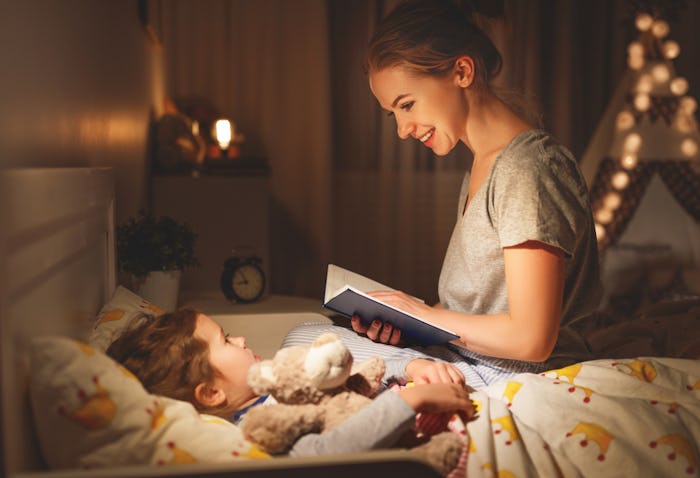News
Nighttime Routines Are Vital For Kids' Sleep Hygiene, According To New Research
If there's anything that many parents know to be true, it's that kids need schedules and routines to really thrive. (Truly, consult any parent whose child is overdue for their afternoon nap or who has been traveling for more than a day, thwarting any sense of normalcy... they will confirm that this is true.) But for those parents whose children are difficult sleepers whether or not their schedules have been followed perfectly, recent research might shed some light on the issue. Nighttime routines are crucial for kids' sleep hygiene, new research suggests, meaning that it's more important than ever that each day concludes with the same old dinner, bath, and books... or whatever it is your family does.
"Sleep hygiene," which the National Sleep Foundation refers to as a "variety of different practices and habits that are necessary to have good nighttime sleep quality and full daytime alertness," is not limited to reducing blue-screen time and not having your 3 p.m. cup of coffee if you're wide awake by 10 p.m. In fact, even kids can be impacted by sleep hygiene practices. The review, which was conducted by a team at the University of British Columbia, found that kids who had stricter routines slept better and had more energy during the day.
To conduct the review, the UBC team analyzed sleep hygiene practices across different countries and cultures, namely looking at 44 studies from 16 different countries, which amounted to nearly 300,000 kids across the world. The groups were separated into infants and toddlers, preschoolers, school-age children, and adolescents.
"Good sleep hygiene gives children the best chances of getting adequate, healthy sleep every day. And healthy sleep is critical in promoting children's growth and development," sleep expert and UBC nursing professor Wendy Hall explained in a news release. "Research tells us that kids who don't get enough sleep on a consistent basis are more likely to have problems at school and develop more slowly than their peers who are getting enough sleep."
She continued:
We found good-to-strong endorsement of certain sleep hygiene practices for younger kids and school-age kids: regular bedtimes, reading before bed, having a quiet bedroom, and self-soothing — where you give them opportunities to go to sleep and go back to sleep on their own, if they wake up in the middle of the night.
Researchers were also able to identify certain triggers for sleep disruption, such as late-night video game use in young adults, or long commutes in young children, and offered potential solutions to helping aide in smoothing out their routines. Interestingly, caffeine didn't seem to play a huge role in sleep disruption, according to researchers.
Sleep hygiene, Hall argued, should be part of a child's education just like any other aspect of their health is.
"Sleep education can form part of school programming," Hall added. "There was a project in a Montreal school where everyone was involved in designing and implementing a sleep intervention — the principal, teachers, parents, kids, and even the Parent Advisory Council. The intervention was effective, because everyone was on board and involved from the outset."
The Cleveland Clinic also recommended that kids don't go to bed hungry, exercise during the day, schedule one hour of quiet time before sleep, and keep the bedroom environment dim and limited to sleep only (as opposed to TV or entertainment) as much as possible.
Ultimately, it's clear that what kids do during the day and leading up to bedtime has a large impact on how well they sleep. As any parent can tell you, a child's sleep quality has a huge impact on their day and overall quality of life, meaning that sleep hygiene is something everyone should be taking more seriously.
This first-time mom wants to have a home birth, but is she ready? Watch how a doula supports a military mom who's determined to have a home birth in Episode One of Romper's Doula Diaries, Season Two, below. Visit Bustle Digital Group's YouTube page for the next three episodes, launching every Monday starting November 26.
